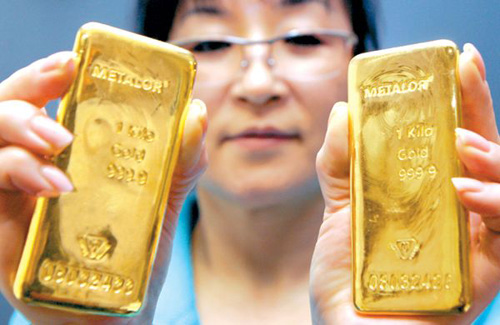On July 18, 2013, Detroit became the largest city in America to ever file for bankruptcy. What was once the birthplace of the American auto industry finally croaked just five years after the auto bailout was pushed into first gear by President George W. Bush; just as former Republican Presidential candidate Mitt Romney predicted in November of 2008.
An attempt to save a million jobs in the auto industry did little for the city’s long-term financial stability. What was once a prosperous city occupied by nearly two million people is now in shambles.
 Over the last sixty years, the city of Detroit has lost one million residents. Some of the city’s remaining residents have had to visit gold bar dealers to cash in their store of wealth in order to have a bit of spending money. There are almost 80,000 abandoned buildings slowly rotting away and crumbling as they dot the landscape.
Over the last sixty years, the city of Detroit has lost one million residents. Some of the city’s remaining residents have had to visit gold bar dealers to cash in their store of wealth in order to have a bit of spending money. There are almost 80,000 abandoned buildings slowly rotting away and crumbling as they dot the landscape.
A city that was built for over a million people is now occupied by 701,475 who cannot afford to leave. After $85 billion was sacrificed by the Federal Government and taxpayers to keep General Motors and Chrysler afloat, it’s natural to wonder why the extent of such Federal aid did not prevent Detroit from filing for bankruptcy.
Many factors are cited for Motor City’s downfall that all stem from the American auto industry in one way or another. Republicans naturally present Detroit as the “poster child” of everything that is wrong with Liberal policy and makes an example of the city to scare people into believing that that is what happens when Democrats are in power for too long. They blame the unions for the billions in pensions the city could not support and a “liberal welfare government.”
While the city owes billions in underfunded and unfunded pensions to public employee unions and retirees, it is not difficult to understand that unions (that agreed to cuts in their pay and health/ vacation benefits) and politicians aligned with one political ideology (Democrat) are not the root of Detroit’s problems.
The answer is much more simple: the decline in manufacturing and the high cost of US labor could not be saved by the government.
Detroit was the 4th richest city in America in the 1960s when the US auto industry encountered little competition from foreign car manufacturers. As the dollar’s value began to decline in 1971 when President Richard Nixon took the country off the gold standard, gasoline prices soared. Suddenly, American cars produced by the “Big Three” (Ford, Chrysler, and General Motors) became unattractive to the American consumer.
With their low gas-mileage and shoddy workmanship, people began to look elsewhere for quality, fuel-efficient vehicles that looked good and stood the test of time.
After the government bailout, the American auto industry began producing high-quality cars that are somewhat competitive with the foreign market; sadly, this came too late. The foreign market exploded before the bailout rendering the auto industry too competitive. The high cost of American labor prevents the Big Three from producing vehicles as flashy and fuel-efficient as those of foreign brands for the same price.
What has truly hindered Detroit’s growth has been its reliance on one industry—car manufacturing, an industry that began to fade away forty years ago. High property taxes and over-regulation prevents new businesses from coming to fruition in the city to replace those that have closed. Being indebted to the government is a huge turn-off to new talent; recent graduates who studied automobile design and engineering will look to other companies for work.
Had Detroit purchased gold and silver during its “heyday,” it may not be in the mess it is today. Instead of questioning whether or not to sell off its prized art collection, the city could be selling its supply of gold and silver to silver dealers for a huge return on their original investment. Since the 1960s, the per-ounce-prices of gold and silver have astronomically soared.
Detroit may have had an opportunity to avoid bankruptcy. This would have deterred Ambac Assurance Corp and other insurers of Detroit bonds from placing enormous pressures on the city’s state-appointed emergency manager, Kevyn Orr to not default on city-backed bonds because doing so would inhibit the city’s ability to borrow in the future. Using gold as a hedge can greatly reduce one’s chances of falling under similar undesirable circumstances.
Author bio: Author is a full time online trader who earns his living by trading in metal and commodities. In case if you are interested to Buy Metal Online you may check the site here at buymetalonline.co.uk. Here you can buy any size of sheet metal to suit your requirement.

